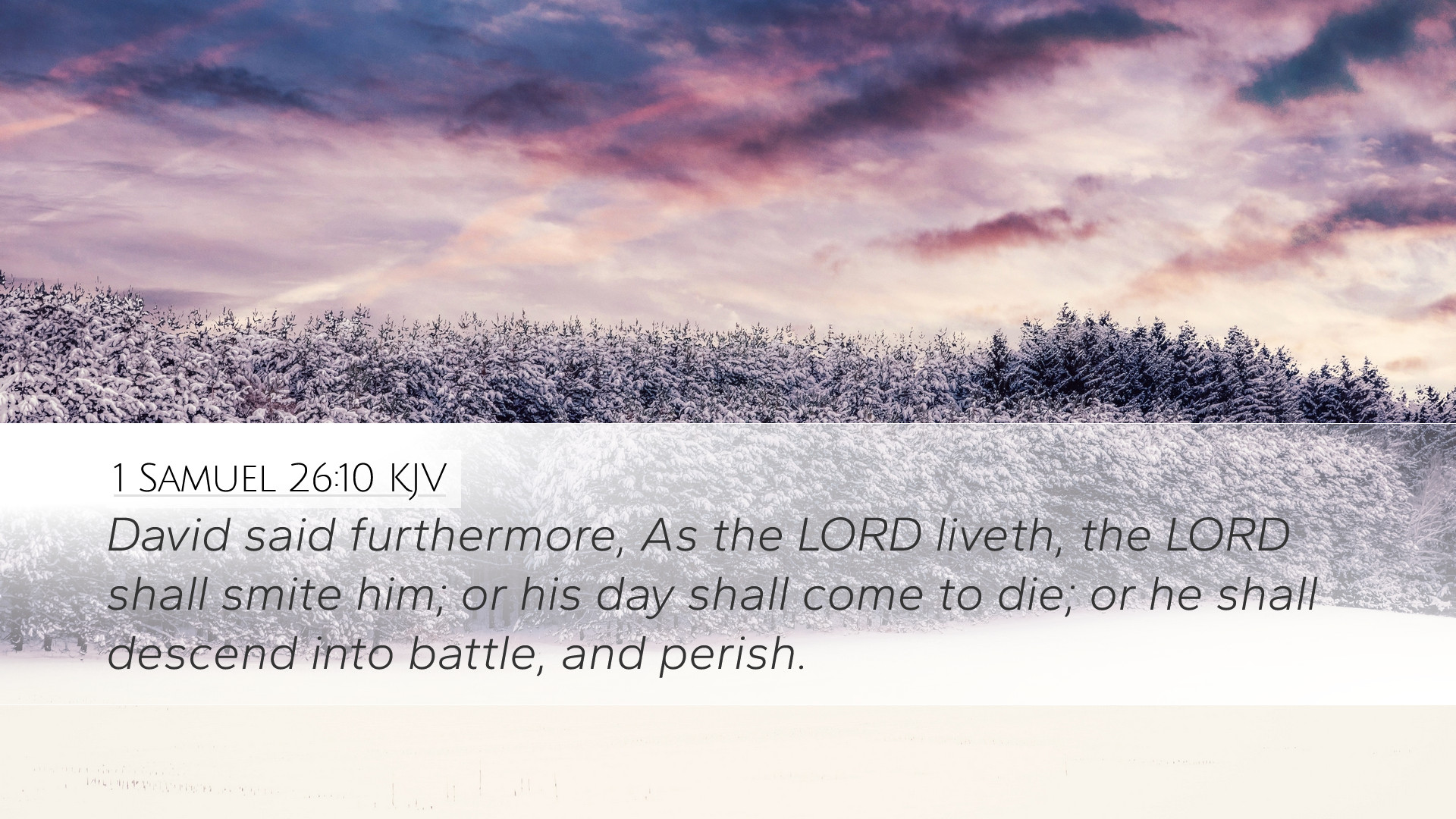Commentary on 1 Samuel 26:10
“David said, As the LORD liveth, the LORD shall smite him; or his day shall come to die; or he shall go down into battle, and perish.”
Introduction
This verse finds its place in a captivating narrative of David's life, showcasing an intricate interplay of divine Providence, moral integrity, and human conflict. This commentary will delve deeply into David's profound acknowledgment of God's sovereignty, as well as the ethical dimensions of his decisions when faced with the opportunity to kill Saul.
Contextual Background
The historical context of 1 Samuel is crucial for understanding this verse. David, the anointed king, finds himself in peril as Saul, the reigning monarch, becomes increasingly paranoid and hostile. David's decision not to harm Saul despite being in a position to do so demonstrates his adherence to God's will and exemplifies his integrity.
- Saul's Pursuit: Saul's relentless pursuit of David stems from jealousy and fear of losing his throne.
- David’s Anointing: David’s previous anointing by Samuel marks him as the future king, positioning him as a legitimate successor to Saul.
- Divine Providence: The narrative emphasizes the overarching theme of God's control over the destinies of individuals.
Analysis of the Verse
David's declaration in this verse carries profound theological implications. He confidently states, "As the LORD liveth," which underscores his faith in God’s active role in the unfolding events of history.
- Divine Judgment: David’s insistence that the LORD will smite Saul indicates his belief that apportioning justice is God’s prerogative.
- Acceptance of Fate: The phrase “or his day shall come to die” reflects an understanding that death is both inevitable and ordained by God.
- Recognition of Context: “or he shall go down into battle, and perish” highlights David's acknowledgment of the unpredictable nature of warfare and its outcomes.
Theological Insights
This passage provides rich insights regarding the nature of God and the life of a believer facing adversity.
- God's Sovereignty: David highlights the teaching that God is in control, guiding the events of life and death.
- Human Agency: While recognizing divine sovereignty, David also shows that he does not take matters into his own hands, illustrating a key principle of faith.
- Moral Integrity: David’s refusal to harm Saul guides believers toward ethical behavior even when justified retribution is at hand.
Commentary Insights
In drawing from the insights of Matthew Henry, Albert Barnes, and Adam Clarke, we discover a nuanced understanding of this passage.
- Matthew Henry: He emphasizes David's patience and reliance on God, arguing that true justice and vengeance belong to the Lord. Henry highlights the spiritual maturity exhibited by David as he refrains from taking vengeance into his own hands.
- Albert Barnes: Barnes points out the significance of David’s restraint. He interprets the statement as a profound expression of faith and the belief in divine timing. Barnes encourages believers to trust in God’s ultimate justice rather than seeking personal vengeance.
- Adam Clarke: Clarke discusses the implications of David’s words, noting that they reflect both confidence and resignation to God’s plan. He emphasizes the importance of recognizing that circumstances may dictate various outcomes, all held within God’s sovereign will.
Application for Pastors and Theologians
This passage serves as a powerful reminder to those in ministry and academia regarding the nature of leadership and the call to integrity.
- Trust in God: Pastors are encouraged to instill their congregations with the importance of trusting in God’s timing and justice.
- Moral Decisions: The narrative prompts leaders to consider how their decisions reflect their faith and commitment to God.
- Ethical Leadership: Scholars can explore the implications of David's actions in light of ethical leadership principles, drawing lessons from the biblical text.
Conclusion
1 Samuel 26:10 serves as a testament to David's character, showcasing his faith in God's justice and his refusal to engage in violence against God's anointed. This commentary synthesizes insights from various public domain sources to enrich the understanding of this pivotal moment in David’s life, illustrating themes of divine sovereignty, moral integrity, and the appropriate response to conflict.


